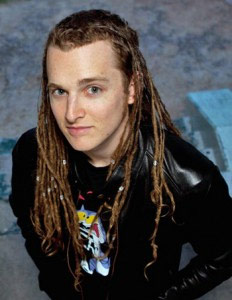Interviewed: Meg White on interviewing, 2011
The lovely Meg White – staff writer at Australian Penthouse – asked me some questions about interviewing. The results are published on her blog, uberwensch.com. Excerpt below.
Andrew McMillen is one of the best journalists around. He’s also one of the best resources, one of the best hustlers, and one of the nicest guys in the biz. I know this because I am a weary old hag, and I’ve watched McMillen go from one success to the next with nary a stitch or strain. Earnest, reliable, skilled and ubiquitous—my praise could carry itself far, far away.
So back when I proposed an interview series, I immediately thought of Andrew. Though his city had just become submerged in floodwater, he agreed to answer my questions and did so in a timely fashion. Then I moved out of my house and found myself stranded, for actual months, in a world of no Internet, so those answers were hidden in the musty dungeon of my inbox. I’ve freed them this morning. Here’s what he had to say:
What were the circumstances behind your best interview?
I’d wanted to interview Robert Forster – he of the Brisbane pop band The Go-Betweens, who were active between 1977 and 2006 – for a long time. I didn’t have a particular ‘hook’ or currency peg, though. Except that the man is a total fucking legend, and not just for his music: he’s also one of the highest-paid music critics in Australia through his monthly column for The Monthly (note: highest-paid is not to be confused with best). So since Mess+Noise, a website dedicated to Australian music, have an irregular section named Icons, where significant contributors to the Australian music scene are interviewed at length, I eventually figured out that Forster would be perfect for it.
I pitched the story to my editor, and he was keen on it, so I asked Forster’s manager for the interview – on the condition that we’d speak at length, about his whole career. We sorted out a time to meet at a bakery near his house. I spent many hours reading and watching everything I could find about Forster and The Go-Betweens online. I arrived with three double-spaced pages of questions. Forster answered them all, thoughtfully and at great length. By the two hour mark, he was late for a meeting, so he gave me a lift across town in his old Volvo. (The interview was over at that point, and we chatted casually.) I called him two days later and we spoke for another half-hour. So around 2.5 hours all up, and around 15,000 words on paper. Not once did he give me anything less than his full attention, or act impatient, or attempt to avoid a question. It was brilliant.
I was paid $100 for the article, which ran in three parts on Mess+Noise. I generally outsource my interview transcriptions. It cost me around $140 for the transcription, so I was effectively operating at a loss. Which is not something I tend to do. But it was such a great opportunity – to ask a hugely influential artist many questions about his whole career – that I was happy to wear the cost.
Another interview of note was a five-minute conversation with the American hip-hop artist Big Boi for The Vine, in a crowded ‘green room’, upstairs at the Hordern Pavilion in Sydney. In no way was this interview representative of my ‘best’ work, but it is an example of how certain situations require the interviewer to think on their feet, and adapt to the mood of the room. I wrote the interview up in a way that blends my inner monologue with Boi’s answers to my questions. It’s here.
Also: I am reasonably proud of my interview with Tool singer Maynard James Keenan. I think I did as well as I could have possibly done, considering I had 15 minutes on the phone with one of the least talkative guys in rock music.
I liked your Big Boi interview. When I read it my first thought was, “I wonder if any of his prepared questions got in there?”
How about I just open up Google Docs and show you the questions I had prepared to ask? (These were then written, in note form, on a small piece of paper, which I carried into the interview.
Big Boi Questions
- How did this gig come about?
- Are you a gamer?
- Fave game of all time?
- Of 2010?
- Frustration that it took three years for Shutterbugg to come out?
- Ever hear The Vines’ version of Ms Jackson?
- Feelings on radio edits? Yelawolf’s verse in ‘You Ain’t No DJ’
- Cee-Lo’s ‘Forget You’
- You seem to put more effort into your videos than most artists. Do you see video as a big part of album process?
- Censorship / logos in videos
- What’s the next material we’ll hear from you?
- Consider yourself more of a performer, producer, songwriter? Actor? Label boss?
- Touring with Vonnegutt this time? If not, who you got singing ‘Follow Us’?
- What other outrageous demands were you able to make for this one-off show?
- Is this the first video game launch you’ve played?
- “The key to this album’s thrilling ride lies within this approach: by taking advantage of the freedom to flit between several personas, the rapper can both shrink and exaggerate his true self. It’s less a schizophrenic episode than a tactic to unlock new songwriting ideas and it’s one that works beautifully.” [note: this is a quote from my review of Big Boi’s album for The Vine, July 2010]
Interesting. And on to Maynard: The interview looks shorter than 15 minutes.
During the Maynard interview, there was a minute or two when he was speaking with someone else nearby. ‘Off camera’, if you will. I think it was a plumbing contractor asking him what needed to be fixed. Evidently he didn’t know, and said a couple of times, “I’m on the phone to Australia.” (Also: how do you think I felt, having my already-brief interview cut down even further due to an external distraction? Yeah.)
How much of your interviews do you throw away?
The answer is, it depends. If it is a relatively well-known/famous person who a lot of people will be interested in reading an interview with, I am a firm believer that the absolute entirety of your conversation (on the record) should be published. Why? Longevity. So that when someone’s Googling “(person’s name) interview” in 10 years’ time, your interview will show up. And not necessarily on the first page of results, or anything like that; just that it exists is very important to me.
If I’m conducting a bunch of interviews with several different people for a feature story, those individual interviews probably don’t deserved to be published beyond the quotes I pull to include in a story. There is a reason why journalists pull quotes, and it usually comes down to two things: a) word/space restrictions, or b) the majority of the interview was unremarkable, irrelevant, or otherwise not worth publishing.
The rule of thumb is: if it’s a famous person, I keep it all. If it’s not, I toss the unusable/uninteresting stuff.
For the full interview, visit Meg’s blog. A big thanks to Meg for the interview.
Elsewhere: Meg White asks, ‘How do I approach pitching as a freelancer?’, April 2010.

 Washington
Washington  Ben Folds/Nick Hornby
Ben Folds/Nick Hornby 